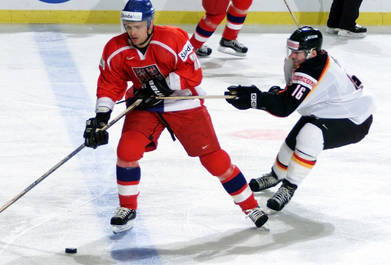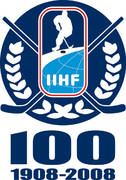Story #31
Autumn 2005 — Zurich, Switzerland & New York, USA
As the National Hockey League was about to resume playing in the fall of 2005 following the lockout which wiped out the 2004-2005 season, the league decided to return to the fans with a more stringent interpretation of the rules. Simply speaking, a foul would be penalized regardless of when it was committed, by whom, or to whatever lesser or greater degree of violation of the rules.
The reason was simple. As the NHL restarted, the league wanted to come back with an improved game where players were allowed to use their skill to their advantage without being hooked, held or interfered with. Led by referee supervisor Stephen Walkom, all owners, managers, coaches and players from the 30 teams were on the same page, and the "new game" became an instant success. The games were faster and more entertaining. Skill and speed became the decisive qualities, not necessarily size and strength.
The IIHF monitored the development very closely. The world governing body had for some years established new guidelines in the IIHF Rule Emphasis Bulletin which called for exactly the same as the NHL had just implemented — a crackdown on obstruction.
Seeing that the NHL's decision and execution of "calling the game by the rule book" was immediately accepted, the IIHF realized that it needed to act quickly to seize the opportunity of implementing the guidelines of its own Rule Emphasis Bulletin.
At the beginning of November, IIHF President René Fasel released this statement: "The revolutionary turnaround pertaining to rule enforcement in the National Hockey League following the lockout has given the world of hockey a new momentum to fully implement the crackdown on all restraining fouls.
"For the first time in hockey history we have the opportunity for the IIHF and the NHL to be on the same page when enforcing the rules and calling restraining fouls like hooking, holding and interference. In the time leading up to the 2006 Olympics in Turin and for the duration of the event it is our responsibility towards the game and its fans to seize this opportunity and showcase hockey as a sport of unique speed and skill to an projected TV audience of 2.3 billion viewers.
"It is our goal to call the games in Turin 2006 according to 2005-2006 IIHF Rule Emphasis Bulletin. The document calls for attention on strict rule enforcement, focusing on hooking, holding and interference infractions. The basic objective of the rule enforcement can be summoned with these lines: Players who use their skill and/or anticipation and have gained a positional advantage on an opponent shall not lose that advantage through illegal use of hands, arms or stick by the defending player. If a player is deprived of that advantage through an illegal act, the appropriate penalty shall be called.”
So why couldn't the IIHF execute its own crackdown on obstruction without having the NHL accepting the new interpretations first? The reason was simple. At the IIHF World Championship, around 100 players are from NHL. A unilateral implementation of the "new rules" would probably have created chaos at the annual flagship event as players coming from overseas suddenly were subjected to an entirely new way of calling the game. This was a risk the IIHF was not prepared to take.
But when the NHL took the first step, the IIHF quickly followed. The mutual efforts by the two organisations proved to be a huge success. The Turin Olympics in February 2006 was the first major championship that was under global scrutiny and the tournament was officiated jointly by IIHF and NHL referees. The game, the fans, and the skilled players were the biggest winners. Turin 2006 will be remembered as one of the best international hockey tournaments ever played.
Today, the crackdown on restraining fouls has been globally accepted and virtually every league in the world follows the guidelines of the IIHF Rule Emphasis Bulletin. No one involved in hockey can imagine going back to the "dark ages" when constant holding, hooking, and endless interference nearly ruined the game and made it almost unwatchable (and unplayable). Very rarely did a league and federation decision have a bigger impact on the future of the game than this one.
As part of the IIHF's 100th anniversary celebrations, www.IIHF.com is featuring the 100 top international hockey stories from the past century (1908-2008). Starting now and continuing through the 2008 IIHF World Championships in Canada, we will bring you approximately three stories a week counting down from Number 100 to Number 11.
The Final Top 10 Countdown will be one of the highlights of the IIHF's Centennial Gala Evening in Quebec City on May 17, the day prior to the Gold Medal Game of the 2008 World Championship.
These are the criteria for inclusion on this list: First, the story has to have had a considerable influence on international hockey. Second, it has to have had either a major immediate impact or a long-lasting significance on the game. Third, although it doesn't necessarily have to be about top players, the story does have to pertain to the highest level of play, notably Olympics, World Championships, and the like. The story can be about a single moment — a goal, a great save, a referee's call — or about an historic event of longer duration — a game, series, tournament, or rule change.
|










